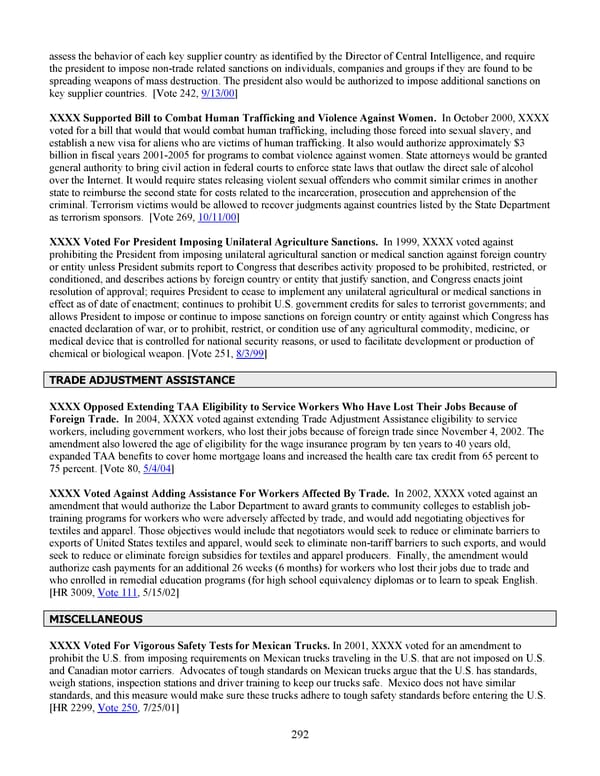assess the behavior of each key supplier country as identified by the Director of Central Intelligence, and require the president to impose non-trade related sanctions on individuals, companies and groups if they are found to be spreading weapons of mass destruction. The president also would be authorized to impose additional sanctions on key supplier countries. [Vote 242, 9/13/00] XXXX Supported Bill to Combat Human Trafficking and Violence Against Women. In October 2000, XXXX voted for a bill that would that would combat human trafficking, including those forced into sexual slavery, and establish a new visa for aliens who are victims of human trafficking. It also would authorize approximately $3 billion in fiscal years 2001-2005 for programs to combat violence against women. State attorneys would be granted general authority to bring civil action in federal courts to enforce state laws that outlaw the direct sale of alcohol over the Internet. It would require states releasing violent sexual offenders who commit similar crimes in another state to reimburse the second state for costs related to the incarceration, prosecution and apprehension of the criminal. Terrorism victims would be allowed to recover judgments against countries listed by the State Department as terrorism sponsors. [Vote 269, 10/11/00] XXXX Voted For President Imposing Unilateral Agriculture Sanctions. In 1999, XXXX voted against prohibiting the President from imposing unilateral agricultural sanction or medical sanction against foreign country or entity unless President submits report to Congress that describes activity proposed to be prohibited, restricted, or conditioned, and describes actions by foreign country or entity that justify sanction, and Congress enacts joint resolution of approval; requires President to cease to implement any unilateral agricultural or medical sanctions in effect as of date of enactment; continues to prohibit U.S. government credits for sales to terrorist governments; and allows President to impose or continue to impose sanctions on foreign country or entity against which Congress has enacted declaration of war, or to prohibit, restrict, or condition use of any agricultural commodity, medicine, or medical device that is controlled for national security reasons, or used to facilitate development or production of chemical or biological weapon. [Vote 251, 8/3/99] TRADE ADJUSTMENT ASSISTANCE XXXX Opposed Extending TAA Eligibility to Service Workers Who Have Lost Their Jobs Because of Foreign Trade. In 2004, XXXX voted against extending Trade Adjustment Assistance eligibility to service workers, including government workers, who lost their jobs because of foreign trade since November 4, 2002. The amendment also lowered the age of eligibility for the wage insurance program by ten years to 40 years old, expanded TAA benefits to cover home mortgage loans and increased the health care tax credit from 65 percent to 75 percent. [Vote 80, 5/4/04] XXXX Voted Against Adding Assistance For Workers Affected By Trade. In 2002, XXXX voted against an amendment that would authorize the Labor Department to award grants to community colleges to establish job- training programs for workers who were adversely affected by trade, and would add negotiating objectives for textiles and apparel. Those objectives would include that negotiators would seek to reduce or eliminate barriers to exports of United States textiles and apparel, would seek to eliminate non-tariff barriers to such exports, and would seek to reduce or eliminate foreign subsidies for textiles and apparel producers. Finally, the amendment would authorize cash payments for an additional 26 weeks (6 months) for workers who lost their jobs due to trade and who enrolled in remedial education programs (for high school equivalency diplomas or to learn to speak English. [HR 3009, Vote 111, 5/15/02] MISCELLANEOUS XXXX Voted For Vigorous Safety Tests for Mexican Trucks. In 2001, XXXX voted for an amendment to prohibit the U.S. from imposing requirements on Mexican trucks traveling in the U.S. that are not imposed on U.S. and Canadian motor carriers. Advocates of tough standards on Mexican trucks argue that the U.S. has standards, weigh stations, inspection stations and driver training to keep our trucks safe. Mexico does not have similar standards, and this measure would make sure these trucks adhere to tough safety standards before entering the U.S. [HR 2299, Vote 250, 7/25/01] 292
 HRC vote skeleton Page 315 Page 317
HRC vote skeleton Page 315 Page 317